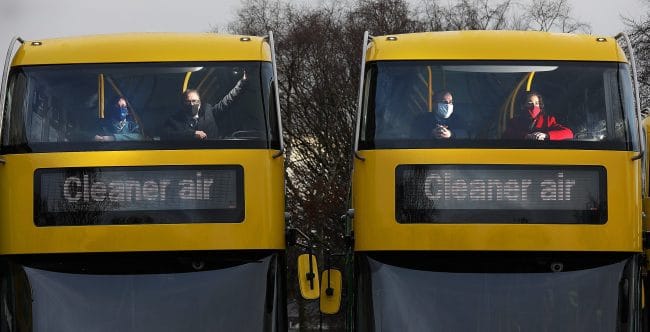Following the recent initiatives by Dublin Bus having reduced fleet emissions by 13,500 tonnes and saved 2.5 million litres of fuel (annually), furthermore it will start its first fully electric route within three years and in on course to become Zero-Emissions Operator by 2050. Dublin Bus has launched its environmental report ‘Driving Change: Our Journey to Zero, that sets out its commitment to become a zero-emissions operator by 2050 and its key role, as Ireland’s largest public service transport provider, in helping to create a more sustainable Ireland.
Carrying up to 142 million people annually, Dublin Bus takes up to 160,000 cars off the road each day (pre COVID-19). Helping commuters to reduce their reliance on the private car is a priority for Dublin Bus and for Ireland. In fact, every single full bus replaces the equivalent of 80 cars on our roads, reducing emissions by over 90% and freeing up 300 metres of roadway. Accelerating the shift away from private cars is the most impactful contribution Dublin Bus can make. It reduces emissions, speeds up journey times and frees up road space. Commenting on the launch of the report Colin Ward Dublin Bus’s Head of Environmental, Health and Safety said “Dublin is home and we’re at the centre of it, driving change to make it a more sustainable city. We have robust plans to deliver on that and continue to deliver solutions that meet the city’s needs.”
From an operational perspective, Dublin Bus has one of the lowest emission fleets in Europe. Since 2017, it has reduced emissions by 13,500 tonnes, which equates to the weight of the entire bus fleet of 1,000 buses and its fuel efficiency measures have reduced consumption of diesel by more than 2.5 million litres per year. Its modern buses produce 87% less emissions per person than car users.
A significant employer in Ireland, the entire 3,620 strong team at Dublin Bus is committed to supporting this journey. They have adopted a range of waste reduction and recycling measures including a ban on single use plastics and recycling 70% of waste across its eight depots.
Key Milestones
▪ First fully electric route – Within three years customers will see the first zero-emission route served by fully electric, battery operated vehicles.
▪ Fully electrified depots – Dublin Bus is currently progressing towards its first fully electrified bus depot within five years with a view to a complete conversion across all depots to zero emissions over a seven-year period.
▪ 50% zero-emissions fleet – Within a ten-year timeframe 50% of the fleet will be made up of diesel hybrid and battery electric buses.
▪ 100% zero-emission fleet by 2050.
By 2027, Dublin Bus expects to introduce an additional 330 buses to respond to the anticipated rise in service demand over this period and the delivery of BusConnects. This will see faster journey times and greater frequency, stimulating accelerated modal shift from the car to the bus. Dublin Bus has pledged to take urgent action to tackle climate change. Its plans are aligned with nine UN Sustainable Development Goals, the 2020 Programme for Government and the Climate Action and Low Carbon Development Action Plan 2021 and it has also signed up to Business in the Community’s Low Carbon Pledge. The company has also partnered with the SEAI on its Public Sector Energy Partnership programme and is a key part of the CIÉ Sustainability Strategy.



